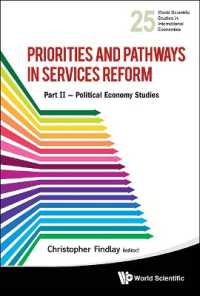Full Description
This book is unlike other RAND publications. While it is based in part on objective research, particularly as it applies to knowing the enemy, it also includes the personal reflections of someone who has thought about terrorism for decades. I initiated RAND's research on terrorism in 1972 with a simple memorandum that observed that this phenomenon was likely to spread and increase and could create serious problems for the United States and its allies; therefore, I proposed, we should take a serious look at it...This book differs from other RAND publications in yet another respect. The reader will find strong personal opinions on these pages. There is much concerning the conduct of the war on terror that I agree with: the muscular initial response to 9/11, the removal of the Taliban government, the relentless pursuit of al Qaeda's leaders and planners, the increasingly sophisticated approach to homeland security, and, although I have deep reservations about the invasion of Iraq, President Bush's determination to avoid an arbitrary timetable for withdrawal. The list of things with which I do not agree is longer: the needless bravado, the arrogant attitude toward needed allies, the exploitation of fear, the exaggerated claims of progress, the serial bending of history and fact, the persistence of a wanted-poster approach while the broader ideological struggle is ignored, the rush to invade Iraq, the failure to deploy sufficient troops there despite the advice of senior military leaders and the head of the Coalition Provisional Authority, the cavalier dismissal of treaties governing the conduct of war, the mistreatment of prisoners, the unimaginable public defense of torture, the use of homeland security funding for political pork barrel spending, and the failure to educate and involve citizens. This book is not intended to serve any political agenda. Its sole objective is to reckon how America can defeat its terrorist foes while preserving its own liberty. Throughout the Cold War, Americans maintained a rough consensus on defense matters, despite substantive disagreements. Unity did not require the suspension of honest differences or of civilized political debate. But today's fierce partisanship has reduced national politics to a gang war. The constant maneuvering for narrow political advantage, the rejection of criticism as disloyalty, the pursuit by interest groups of their own exclusive agendas, and the radio, television, newspaper, and Internet debates that thrive on provocation and partisan zeal provide a poor platform for the difficult and sustained effort that America faces. All of these trends imperil the sense of community required to withstand the struggle ahead. We don't need unanimity. We do need unity. Democracy is our strength. Partisanship is our weakness...Excerpt from "Unconquerable Nation: Knowing Our Enemy, Strengthening Ourselves". As the United States battles a fierce insurgency in Iraq, pursues a tenacious Taliban movement in Afghanistan, and wages a global campaign to dismantle the jihadist terrorist enterprise responsible for 9/11, many Americans are asking, "Where are we in this global struggle? Who are we fighting? What are we fighting against? What are we fighting for?" On the fifth anniversary of the 9/11 terrorist attacks, Brian Michael Jenkins presents a clear-sighted and sober analysis of where we are today in the struggle against terrorism. An internationally renowned authority on terrorism, Jenkins distills the jihadists' operational code and suggests how they might assess their situation very differently than how we might do so. He outlines a ferociously pragmatic but principled approach that goes beyond attacking terrorist networks and operational capabilities to defeating their entire missionary enterprise by deterring their recruitment, encouraging defections, and converting those in captivity. Jenkins believes that homeland security should move beyond gates and guards and become the impetus for rebuilding America's decaying infrastructure. He advises Americans to adopt a realistic approach to risk and get a lot smarter about security. America needs to build upon its traditions of determination and self-reliance and, above all, preserve its commitment to American values of democracy, civil freedom, and individual liberties. Preserving these values is no mere matter of morality, he argues; it is a strategic imperative. How we deal with the terrorist threat is one of the major challenges of this century. Jenkins points the way forward.
Contents
How We Prevail; An Appreciation of the Situation; Knowing Our Enemy; A Sharper Sword: Strategic Principles for Defeating Today's Enemy; A Durable Shield: Strategies for Strengthening Ourselves; Appendix A: Chronology of Jihadist Attacks Since September 11, 2001; Appendix B: What Were They Thinking About Doing?; Bibliography: Combating Terrorism: A Reading List; Index.








